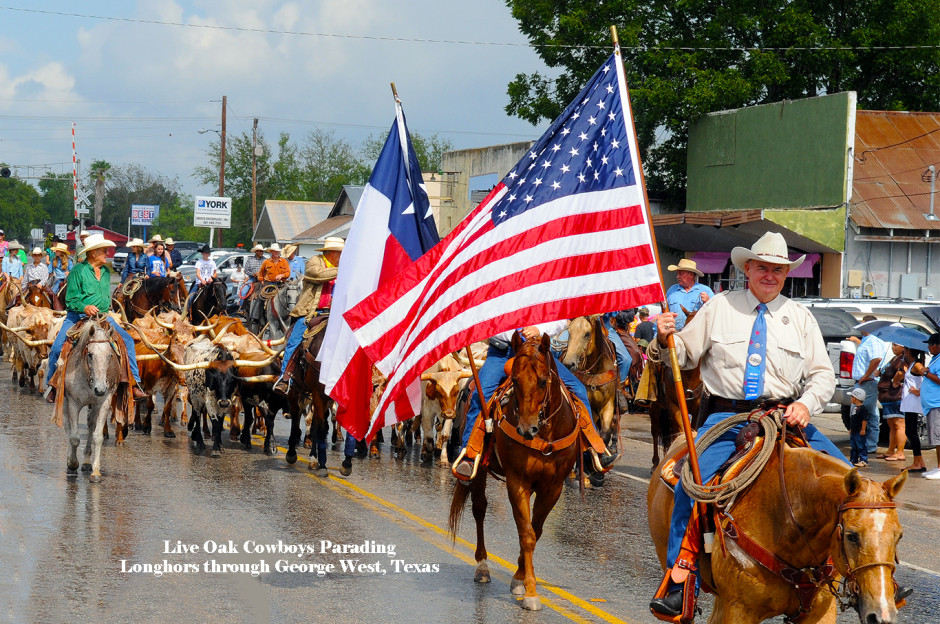
Live Oak County Historical Commission Oral History Collection
Live Oak County Historical Commission values the memory of our people's history. In 1981, the LOCHC published a full book of over 600 prepared oral histories. Some of those and others which have been collected since that, and are currently being collected, will be displayed in this chapter of our website. Glynis Holm Strause is Oral History Chair of the current LOCHC effort and hosts local stories at the annual George West Storyfest the first weekend in November. George West is known as The Storytelling Capital of Texas. Glynis is also spearheading recorded sessions in the Dobie West Theatre during the Storyfest celebration. Be sure to enjoy the presentations and share some of your family's history in the recorded sessions. The first recording began on November 4, 2017 with Ross Harris, President of SouthTrust Bank in George West and Chair of the Live Oak County Historical Commission.
Oral histories are presented on this website in alphabetical order of subject surname on the left sidebar. These are verbatim interviews, presentations, and presenter prepared written transcriptions. An introduction label for each gives the source. We are working to construct an oral history collection that will be culturally and historically informative for you.
Philosopher's Rock, Barton Springs-Austin, Texas. J Frank Dobie (center), illustrious Live Oak County writer and folklorist, debates strengths and differences between documented history and traditional oral history, with friends Prescott Webb (right), one of Texas's most significant and influential historical scholars, and Roy Bedicheck (left), Texas writer, teacher, and naturalist. They met at this rock under ages old pecan trees regularly. "Intense conversations" often ended cooling off in the year round, refreshing spring waters of Barton Springs. Webb was not a swimmer. Their friendship is a lasting legacy of open-minded, critical thinking.
Sculpture by Glenna Goodacre, born in Lubbock Texas; she also sculpted Women in Vietnam Memorial in Washington, D.C. and Sacajawea on the Sacajawea dollar coin. Photo by Richard Hudson.
Below from The Texas Historical Commission:
WHAT ORAL HISTORY IS AND WHAT IT ISN'T
Oral history is the collection and recording of personal memoirs as historical documentation. It documents forms of discourse normally not documented and it emphasizes the significance of human experience. Oral history is normally not the best method for obtaining factual data, such as specific dates, places or times, because people rarely remember such detail accurately. More traditional historical research methods — courthouse records, club minutes, newspaper accounts — are best for specifics.
Oral history is the best method to use, however, to get an idea not only of what happened, but what past times meant to people and how it felt to be a part of those times.
Many people use the term oral history interchangeably with oral tradition, but the two are not the same. Oral tradition is a body of narratives passed down verbally from generation to generation beyond the lifetime of any one individual. It includes stories, songs, sayings, memorized speeches and traditional accounts of past events. Oral history, on the other hand, involves eyewitness accounts and reminiscences about events and experiences which occurred during the lifetime of the person being interviewed.
An oral history interview should focus on personal memories and not on hearsay or folk tradition. In practice, however, these often merge because oral history is storytelling. When we ask people to talk about the past, we are asking them to tell us stories from memory. When they do, they often select and emphasize certain features while minimizing others. People do this to personalize their stories for the listener, to make the story relevant to today, or to make sense of their experiences. It is human nature to use stories to explain things. Interviewers should be aware of this process of story making — the decision-making involved in telling a story and the conditions that determine it.
In addition to providing an added dimension to historical research, an oral history project can:
■ foster appreciation for little-known or rapidly vanishing ways of life;
■ verify the historicity of events which cannot be determined by traditional methods of historical research;
■ correct stereotypical images of lifeways and people;
■ and recover and preserve important aspects of a human experience that would otherwise go undocumented.
Collecting, preserving and sharing oral histories not only transmits knowledge from one generation to the next, it enhances our understanding of the past by illuminating personal experience. (From the Texas Historical Commission website. For further information check out "Fundamentals of Oral History - Texas Preservation Guidelines".)
